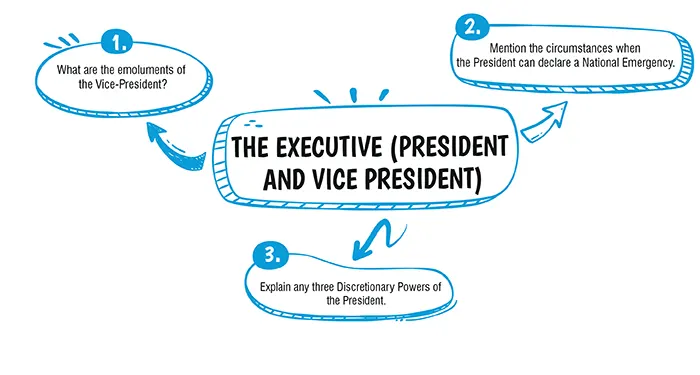Home / Board / ICSE / important Questions / Class 10 / History & Civics / The Executive (President and Vice President)
Table of Contents

Ans.(c) Article 360
Explanation:
Financial emergency is caused by a threat to financial stability of the country.It has been mentioned under Article 360 of the Indian Constitution.
Ans.(a) 2/3rd of the total members of the House
Explanation:
When a President is to be impeached for violation of the Constitution, the charge shall be preferred by either House of Parliament if supported by not less than two-thirds of the total membership of the House.
Explanation:
Being the Vice-President of India, he is not entitled for any salary, but he is entitled to the salary and allowances payable to the Chairman of the Rajya Sabha. When he acts as the President of India, he draws the monthly emolument of the President.
Explanation:
The circumstances under which the President can declare a National Emergency are :
(i) General or National Emergency (Article 352) caused by war, external aggression or armed rebellion.
(ii) Emergency due to failure of constitutional machinery in a state (Article 360).
Explanation:
1. The President appoints the incumbent Prime Minister in case of sudden death, where the ruling legislative party is unable to meet immediately to elect a leader.
2. When the ruling party would lose majority support in Lok Sabha or when a vote of no-confidence may have been passed against, it requires a President to dissolve the Lok Sabha. Then it is at discretion of the President to either dissolve the House or ask another party to prove majority on the floor of the House.
3. The President can dismiss ministers in case the Council of Ministers loses the confidence of the House but refuses to resign.
Download Mind Map of this chapter
Download NowWant to Practice Mock Tests of this chapter
Practice NowDownload Important Questions of this chapter
Download NowCBSE Important Questions Class 10
ICSE Important Questions Class 10
CBSE Important Questions Class 10
ICSE Important Questions Class 10